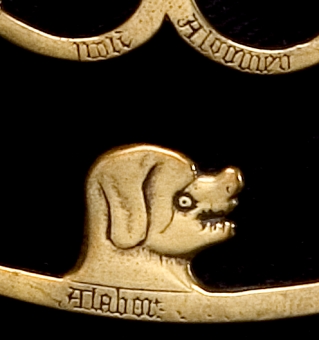| Date | ca. 1370 |
| Place | England (?) |
| Material | Brass |
| Inventory no. | 49359 |
| Acquisition | Presented by A. E. Gunther in 1986 |
This astrolabe belongs to a small group of instruments that are taken to represent the astrolabe that Geoffrey Chaucer intended to give to 'his son' Lewis as he went off to study at Oxford. The rete on this instrument closely resembles those illustrating the manuscripts of Chaucer's Treatise on the astrolabe, which he composed around 1391. The rete is characterized by the three zoomorphic star pointers: a small bird pointing to the star Vega; a dog's head at the bottom of the rete indicating Sirius, the dog star; and the dragon's head pointing to Antares. Originally, a tongue probably extended from the dog's head to indicate Sirius's location more precisely.
Such zoomorphic features were more common on Arabic instruments than on European astrolabes. The 14th-century 'Chaucerian' astrolabes, including the 'Painswick' astrolabe (inventory no. 47869), show a number of zoomorphic star pointers. Later European instruments have fewer such features, while zoomorphs remained common on Persian astrolabes well into the 19th century.
View all
images for this astrolabe
View
detailed provenance for this astrolabe
Mater
The mater and limb are of one-piece construction. The notch that admits the tab from the plates is located at the throne. Scales on the limb: equal hours scale; zodiacal signs scale. More informationBack
In addition to the scales catalogued, there is an incomplete semi-circular scale in the upper two quadrants. This was probably intended to be an epact or other calendrical scale. The back contains 4 scales of the following types: Zodiacal signs; Altitude; Calendar; Shadow square. More informationRete, Pin & Wedge
The rete contains 19 stars. The rete contains zoomorphs: three zoomorphic features: vega is indicated by a bird-shaped star pointer. sirius is indicated by a star pointer shaped like a dog's head. a dragon's head points to antares The zodiac on the rete is labelled: Aries , Taurus , Gemini , Cancer , Leo , Virgo , Libra , Scorpio , Sagittari9 , Capricorn9 , Aquari9 , Pisces.The rete contains 2 scales of the following types: Ecliptic; Lunar cycle.
The rete is attached using a pin & wedge. The wedge is, in fact, a small brad. It seems likely that the present brad is a replacement, given its small size. More information
Rules & Alidades
| Type | Details |
|---|---|
| Rule | Double-ended, counter-changed. |
| Alidade | Double-ended, counter-changed. |



